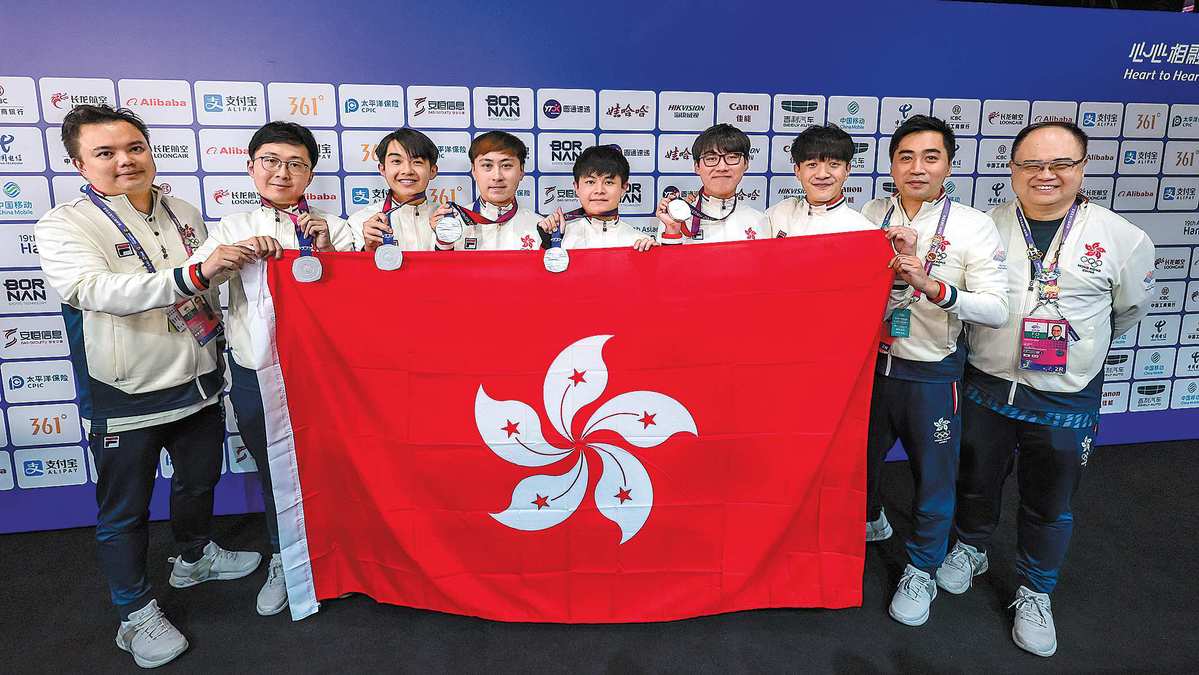HK gains far more than a medal for esports

The Hong Kong team competes in the final of the esports event Dream Three Kingdoms 2. ANDY CHONG/CHINA DAILY
Winning silver at Asian Games boosts industry's development, promotes better understanding
When Jazkit Chan Cheuk-kit was 5, he developed a love for game machines in a stationery shop near his home in Hong Kong.
Three decades later, his passion for games resulted in him standing on the podium to represent Hong Kong at the 19th Asian Games in Hangzhou, Zhejiang province, basking in cheers and applause from thousands of spectators as he proudly wore a silver medal around his neck.
Chan and his four teammates won the medal on Sept 30 in the final of the esports event Dream Three Kingdoms 2.
Esports made its debut as a demonstration event at the Asian Games in Jakarta, the Indonesian capital, in 2018. This year, esports was elevated to the official competition program, and featured seven events, including Dream Three Kingdoms 2. Chan and his team etched their names in history by securing Hong Kong's first official esports medal at the Games.
The team members said the medal symbolizes their enduring passion for games over the years, coupled with the relentless training they underwent for six months.
Securing victory calls for dedication, perseverance and hard work, but these qualities demand particular emphasis in esports. The medal won by Hong Kong has a deeper significance, as it can help dispel misconceptions about esports, the team members said, adding that their success can foster the growth of the city's entire esports system.
Chan, who turns 34 next month, started by playing arcade games, before his interests widened to include single-player computer games and online games for a number of players. His favorite is League of Legends, or LoL, a popular multiplayer online battle arena game, where two teams of five compete to destroy each other's fortress to secure victory.
As his love for games grew, Chan ventured into the world of esports. He used to be a professional player, before becoming a coach and manager for an esports club.
When he learned that esports would be included as an official competition at the Asian Games, he had no hesitation in deciding to take part.
"It was a once-in-a-lifetime opportunity that I couldn't miss," he said.
Although LoL was chosen as an event for the Asian Games, it already had a large number of full-time professional players. Chan then turned his attention to Dream Three Kingdoms 2.
Developed by a Chinese company in Hangzhou, Dream Three Kingdoms 2 is an online battle game that draws inspiration from the Three Kingdoms era in ancient China. It shares some similarities with LoL, where players form a team of five to bring down the opposing team's fortress to achieve victory.
Although Chan had never played the game before, he insisted on joining in, driven by his childhood dream of taking part in major sports competitions.
He first contacted skilled players who had achieved good results in esports competitions in Hong Kong, along with teammates he had played with in the past. He asked them if they were willing to train carefully, retaining those who said they were.
In May, Chan formed a team comprising Martin Yau Man-tin, Roy Yip Ho-lam, Tinky Yuen Pak-lam, Law Hing-lung and himself.

Players compete at the China Hangzhou Esports Centre. ANDY CHONG/CHINA DAILY
Problems emerge
However, they soon encountered obstacles in embarking on their Asian Games journey.
All five players had never played Dream Three Kingdoms 2 before. Despite it being similar to LoL, they still needed to learn the game from scratch. They learned about the characters one by one, mastered the equipment required for the game, got to understand its maps, and adopted a new pace to play the game. "Everything was totally new for us," Law said.
In addition, as Dream Three Kingdoms 2 is a niche game, there was a lack of instructional material and footage about it on the internet.
Undeterred, the team members searched every available resource they could find.
Every player also had his own full-time work to do in addition to preparing for the Asian Games. Their jobs include being a pastry chef at a hotel, a games anchor, and an engineer.
Law said, "We had to squeeze in time and sacrifice relaxation to improve."
Furthermore, the team faced an age disadvantage. While the prime age for an esports player is generally considered to be 18 or even younger, the Hong Kong team's ages ranged from 25 to 34.
The players faced younger competitors with quicker reactions, a keener focus and greater endurance than themselves. To counter the age gap, they made an extra effort to practice harder.
After months of training, in late July, the team took part in Road to Asian Games, the preliminary and qualifying round for esports at the Games in Hangzhou.
esports teams assessed their rivals' abilities ahead of the official competitions. While the Hong Kong team achieved good results against opponents, it faced a significant challenge against the Chinese national side, which comprised highly skilled professional players with more than 10 years' experience.
Law said: "After finding that I was not making any progress despite continuous practice, I nearly lost my motivation. It seemed impossible for us to surpass the national team in a short period."
Still, the Hong Kong team members refused to give up, and researched strategies and methods to improve themselves.
One crucial decision they made was to transform Martin Yau from player to coach.
Yau said that at first, the team did not see the need for a coach, but later it realized a coach could play an invaluable role in helping with games reviews and analysis, summarizing play, and providing emotional support when morale was low.
To fill Yau's position, Yip turned to his brother, Vlam Yip Wai-lam, who had competed alongside him on numerous occasions.
At the time, Vlam Yip was working full time as a civil servant, but he quickly decided to resign, committing himself fully to the Asian Games.
"It was not a hard decision for me. This was a once-in-a-lifetime opportunity, and I had to take it," Vlam Yip said.
Pushed by the deadline for competition, the other team members decided either to take a break from work or resign.
In the following months, they devoted themselves fully to rigorous practice sessions. They spent hours preparing together, discussing tactics in group chats, analyzing videos of their matches, and finding ways to improve their performances.
Despite failing against the national side, the Hong Kong team's dedication led to a remarkable improvement, and the players triumphed against all the other teams they faced from different countries and regions to win silver in the final.

Jazkit Chan Cheuk-kit hugs a national team player after the final of the Dream Three Kingdoms 2 event on Sept 30. ANDY CHONG/CHINA DAILY
Players' aims
Chan said it is a common misperception among many people, especially the younger generation, that playing esports is merely a way to escape studies or other responsibilities.
Vlam Yip added that although the roots of esports lie in video games, the pursuit goes way beyond this.
For example, esports and video games are played for different reasons, he said. People play video games to find happiness in the virtual world, whereas esports players strive for victory and aim for the highest standards.
Finding happiness does not require much effort, but achieving success in esports calls for unwavering commitment to arduous training, fostering teamwork among players, and constantly pushing oneself to the limit, Vlam Yip added.
Chan said that during competition at the Asian Games, several teammates became ill, with some developing temperatures of more than 40 C. Despite their physical discomfort, they decided not to take medication to ensure they could perform to their best and avoid any risk of accidental doping.
Similar to athletes in traditional sports, esports players also require self-discipline, he added.
Furthermore, Law said that unlike video games that offer shortcuts to victory, esports places a strong emphasis on fairness.
Video games players can generally improve themselves by buying equipment, but in esports, players undergo strict training, repetitive practice, and hard study to achieve the desired results, Law said.
He thinks that esports is far from easy to play, and the competition is fierce — sometimes demanding more effort than academic studies.
Chan said that due to the physical and mental demands, commitment to fairness, and intense competition, esports is increasingly gaining recognition as a legitimate sport.

Chan and his teammates celebrate winning the silver medal in the final. ANDY CHONG/CHINA DAILY
Promising future
Eddy Chen Lung-shing, president of Esports Association Hong Kong, said the city's first esports medal is significant, as it can promote a better understanding of esports in the local community, and will improve the entire local esports system.
Hong Kong's neighbors, such as the Chinese mainland and South Korea, boast well-developed esports industries.
Last year, the mainland games market generated revenue of 144.50 billion yuan ($19.76 billion), while that in South Korea saw revenue of 118.2 billion yuan.
The esports industry is expected to continue growing.
Released in July under guidance from the China Esports Industry Research Institute, a research report suggests that global esports revenue will stand at nearly $1.8 billion this year, with the number of core esports enthusiasts estimated to reach 641 million by 2025.
Chen said Hong Kong should not miss out on this trend.
He said although there is a gap between the city's esports industry and the strongest areas in this field, such as the mainland and South Korea, the local industry has grown steadily since before the COVID-19 pandemic emerged.
In 2017, Hong Kong hosted an esports music festival, and two years later, the largest integrated esports arena in Asia was completed in the city's Mongkok district. At that time, a number of professional esports teams were formed in the city, and the government and commercial organizations were eager to invest in the industry, Chen said.
However, the pandemic disrupted the industry's momentum. Offline tournaments could not be organized, leading to a lack of commercial investment, which hit the industry hard, Chen said.
The medal won by the Hong Kong team can help restore development of the local esports industry, Chen said. It can also encourage the government to place greater importance on the esports industry.
Various countries worldwide have introduced measures to promote esports.
In November, Germany increased its national budget for the games industry. The same month, Brazil passed a bill to enhance its games industry. In September last year, Saudi Arabia launched a national e-games strategy to establish itself as a global games center by 2030 through 86 initiatives.
In comparison, only a limited number of policies have been introduced in Hong Kong to support the esports industry.
Chen said that apart from a HK $100 million ($12.78 million) allocation in the 2018-19 budget to promote early development of the industry, no significant supportive measures have been announced since.
The silver medal won by Hong Kong can also help promote commercialization of the local esports industry.
On the mainland, esports has become a highly commercialized industry. Games companies organize large-scale leagues, which are joined by players signed by various clubs.
With large fan bases, tournaments quickly attract sponsors, ensuring that esports players earn a good living through their wages, tournament bonuses and advertising, among other sources of income.
The well-developed esports sector also promotes peripheral industries, such as video websites, live broadcasting platforms, and e-commerce platforms, attracting more players and viewers to create a positive business cycle.
In contrast, some people in Hong Kong still view esports solely as games, and are opposed to the industry. In addition, spectators in the city are not in the habit of spending money to watch esports competitions, and the local market for esports is relatively small.
As a result, Chen said it is challenging to generate profits from organizing tournaments, find brand sponsorship for tournaments, and sustain professional players financially. This situation has led to a loss of esports talent in Hong Kong.
However, the recognition gained from winning the silver medal can positively transform public perceptions of esports to attract a larger audience and attention, Chen said. It can also draw potential investment from stakeholders to create a more conducive environment for the commercialization of esports in Hong Kong.
The city has its advantages in developing esports, Chen said.
Under the "one country, two systems" policy, Hong Kong, as a special administrative region, takes part in international competitions as a separate jurisdiction. This provides an opportunity for players who may face challenges in competing in other regions, thus helping the city woo talent.
Hong Kong's international status also positions it favorably for organizing large-scale international competitions and arranging global esports exchanges.
Furthermore, as the domestic games market becomes saturated, many mainland companies are looking to expand overseas. Hong Kong, with its strategic location and international connectivity, can play a pivotal role in facilitating this expansion.
"By using these advantages and the impact of the silver medal, I have full confidence in the development of esports in Hong Kong," Chen said.
Photos
Related Stories
- Int'l summit in Hong Kong highlights high-quality construction of Belt and Road
- Hong Kong uniquely placed to add value to RCEP members: HKSAR chief executive
- High-speed rail links HK with new destinations
- Hong Kong's talent trawl OKs over 100,000 admission applications
- Hong Kong volunteers rise to occasion at Asian Games
- Strengthening ties with the homeland: Autumn's harvest for Hong Kong and Macao
Copyright © 2023 People's Daily Online. All Rights Reserved.









